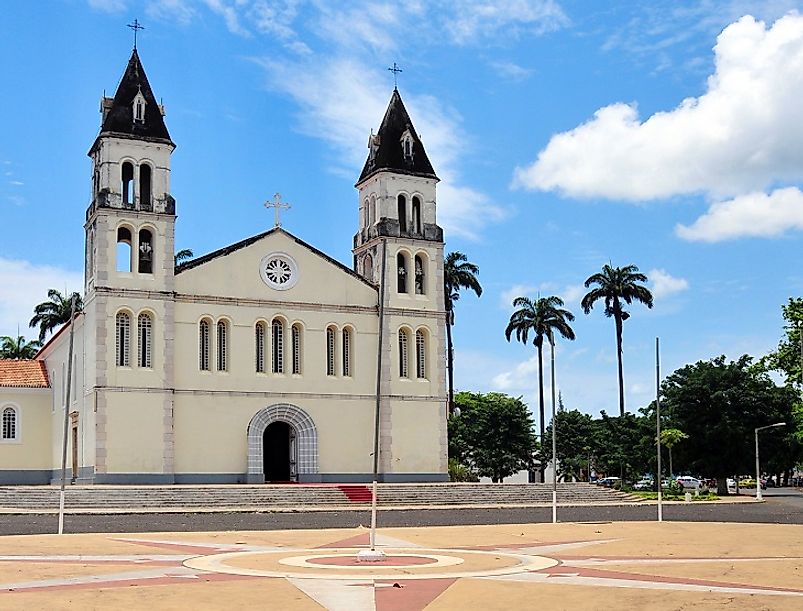Religion In Sao Tome And Principe

Former Portuguese colonial influences can still be seen in the widespread adherence to Roman Catholicism in Sao Tome and Principle. The missionaries from Portugal brought the gospel in the countries of West Africa and Sao Tome was recruited as one of the reach-out zones. As Catholicism prospered and spread, Protestant churches started and though not as influential as the Catholic churches, the evangelical churches gained popularity and some people converted to the faith. Apart from Christianity, the country has Muslims, Atheists, and traditional believers. However, some syncretistic beliefs have risen where some Muslims and Christians adhere to some aspects of traditional faiths.
Roman Catholic Christian
The Roman Catholic Church has the biggest following in the country, with its adherents comprising approximately 63.8% of the nation's population. The religion influence dates back to the 13th Century when the first Portuguese settlers inhabited the Gulf of Guinea in West Africa. The Portuguese brought the religion in Sao Tome and Principle through their missionary activities. The country has a single diocese found in the city of Sao Tome called the Roman Catholic Diocese of Sao Tome and Principe. The diocese was established in 1534 as part of the Portugal’s Metropolitan Archdiocese of Funchal. The main Catholic church in the country is the Cathedral of our Lady of Grace in Sao Tome. The church has the cross of Sao Tome as the ecclesiastical decoration.
Atheism and Agnosticism
The atheist and the agnostic communities constitute 18.5% of the population. These people do not identify themselves with any religion but rather they choose to be independent of religious faiths. However, this group attends weddings, burials, and other celebrations. The group coexists peacefully with other religious groups in the country.
Protestants and Other Non-Catholic Christians
Protestants in the country predominately include Methodist and Evangelical church members. The faith has grown considerably over the last few years due to the missionary activities. Churches such as the Evangelic Assembly of Christ, the Thokoist Church, and the Universal Church of Christ have spread around the country spreading the gospel. Today the faith has a population of around 8,000, which is approximately 8.4% of the population according to the World Christians Database.
Other Faiths
The country has attained a Muslim population of around 2% due to its proximity to mainland Africa. Over the last ten years, an influx of migrants from Cameroon and Nigeria in the country has contributed to the Muslim population in the country. Other religions in the country include Jewish with less than 1% of the population, similar to Hinduism, and Buddhists faiths. These other beliefs make a combined 6.3%of the population.
Polynesian Mana
The Mana Church dates back to Lisbon in 1984. Mana in those days was a term used to describe the origin of religion and the Supreme Being. A religion evolved, and a people faithful to the course also increased. The Portuguese who colonized the nations of West Africa brought the religion in the same way as they introduced Christianity. Mana believe in supernatural forces and powers that ascribe to persons, spirits, and natural objects. The Polynesian navigators might have also contributed to the spread of the faith, as they colonized small islands in the Pacific. Today, it has a 2.3% share of the population, which amounts to around 4,380 people. The religion continues to spread in other regions.
Jehovah's Witness Christian
The first Jehovah Witness came to the country in 1950 as a prisoner from Portuguese colonies in Africa who came to work in the labor camps on the island. The prisoner, deported from Mozambique for preaching the gospel, converted more followers. As more prisoners of war from Angola arrived in the country and during their incarceration, they shared the good news with the local inhabitants. The turmoil and struggle by the religion continued for a long time with executions and religious persecution. However, in 1993 the government finally registered the Jehovah Witness faith bringing an end to the hardships of the converted. From then the faith prospered as people endeared it, and today it has 1% hold on the population. The religion believes in God, the institution of marriage and carries out baptismal.
Freedom of Religion in Sao Tome and Principe
The constitution of Sao Tome and Principle protects all religious groups. The government to some extent also respects religious freedom with no religious discrimination. Upcoming religious groups must register with the government as per the Constitution. The state then publishes the approved groups. There are no reported cases of religious persecutions in the country.
Religion In Sao Tome And Principe
| Rank | Belief System | Share of Contemporary Sao Tomean Population |
|---|---|---|
| 1 | Roman Catholic Christian | 63.8% |
| 2 | Atheist or Agnostic | 18.5% |
| 3 | Adventist, Evangelical, or Other Protestant Christian | 8.4% |
| 4 | Other Faiths | 6.3% |
| 5 | Polynesian Mana | 2.0% |
| 6 | Jehovah's Witness Christian | 1.0% |







